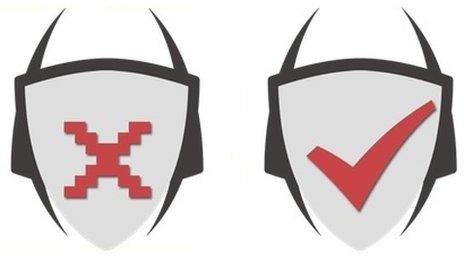Google refunding buyers of fake anti-virus app
- Published

Google is refunding users who unsuspectingly bought a fake anti-virus app from its Play Store.
The Virus Shield app reached the number one ranking in the Play Store with over 10,000 downloads before it was removed.
The fake app was uncovered by news site Android Police, which looked at the app's code and discovered it did nothing.
As well as a full refund, users are being given credit to spend in the Play Store.
The app claimed to "prevent harmful apps from being installed on your device". But when Android Police tested the app, it discovered that when a user tapped on an icon to activate the "virus shield" all that happened was a new icon was displayed.
False claim
After the story was published, the fake app was removed from the Play Store. It had first appeared on the site on 28 March and was taken down on 6 April.
Google emailed users who had purchased the app, which cost $3.99 (£2.35), offering a full refund.
"We're reaching out to you because you recently purchased the 'Virus Shield' app on Google Play," the email said.
"This app made the false claim that it provided one-click virus protection; in reality, it did not.
"Google Play's policies strictly prohibit false claims like these, and in light of this, we're refunding you for your 'Virus Shield' purchase. You should see funds returned to your account within the next 14 days.
"Additionally we'd like to offer you $5 promotional credit, which can be used to purchase digital content on Google Play."
The developer of the app spoke to the Guardian after the app was removed from the Play Store and said that it had been a "foolish mistake" and that this version of the app had not been intended for release.
"The app version that was decompiled by Android Police was not intended to be released. It was an early placeholder that our user-interface designer created. There was a mix-up between the version that contained the anti-virus code for our app," said Jesse Carter.
- Published11 February 2014
- Published27 March 2014